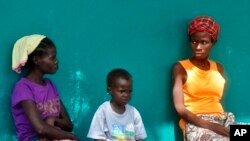The chief economist of the African Development Bank says Ebola's effect on West African economies is "astounding," - but he is optimistic that Guinea, Liberia and Sierra Leone will bounce back faster than some experts expect. He spoke from a conference in Ethiopia's capital.
The Ebola virus’s deadly rampage through West Africa has claimed more than just lives - it has threatened the region’s economy, slowing trade and decreasing productivity. On this point, leaders at the African Development Bank agree with their colleagues at the World Bank and other financial institutions that have warned of the massive economic impact of the often-fatal virus.
A complex issue
The bank’s acting chief economist and vice-president Steve Kayizzi-Mugerwa spoke from Ethiopia’s capital, Addis Ababa, on Sunday.
“The Ebola issue is quite complex. It took everybody by surprise, a little bit. And so, when you put it all together, the numbers, and the rapid impact it had on the region is quite astounding,” he said.
However, he does not share the grim view of the World Bank, which earlier this month predicted that the West African region around Guinea, Liberia and Sierra Leone would suffer huge losses. Kayizzi-Mugerwa did not offer his own figure, but said he thought the World Bank’s figure of more than $30 billion in losses was too pessimistic.
More optimistic previsions
“Of course I don’t believe that the … World Bank estimated that the whole region would lose $35 billion U.S. dollars. Of course that report has a lot of disclaimers, so the numbers might be off, or we might not have the right information," he said. "So $35 billion is way out, I would think. But there is definitely going to be some cost to all this. Especially the cost of rumor and fear, and so on, is probably much greater than otherwise.”
That’s because, he says, two of the three affected nations were already hurting - with their economies perilously weak and lacking the strong infrastructure needed to fight off an outbreak. Other African nations, he says, would likely fare better economically if Ebola were to hit their shores.
“They were sort of unique, these countries. In fact, they have been hit hard because they already were suffering quite heavily. We’re only trying, very slowly, to get back to normal following years and years of disruption, in the case of Liberia and Sierra Leone, an incredibly long civil war. So I think that other African countries, East Africa for example, is doing quite well. We cannot quite predict how they could resist shocks or what type, but I would imagine they would stand a better chance of resisting shocks,” said Kayizzi-Mugerwa.
His optimistic predictions come amid mixed reports about the virus’s progress in West Africa - the World Health Organization says cases in Liberia have leveled off, but the African Governance Initiative has found that the virus is accelerating in rural Sierra Leone.




